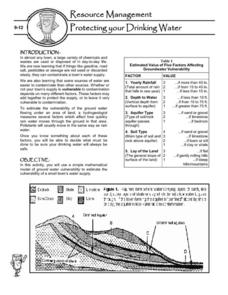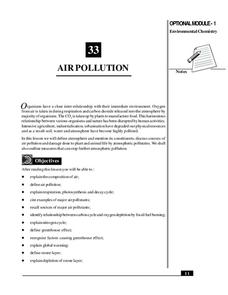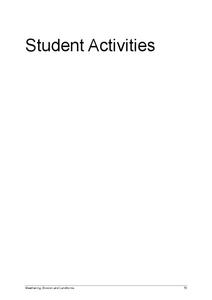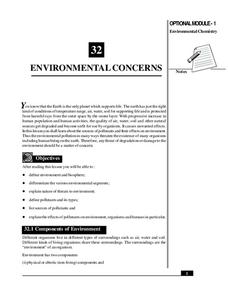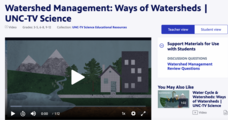Marine Institute
Water Pollution
Sixth graders investigate the various types of pollutants found in water and ways to help prevent water pollution. Through a hands-on experiment, students create samples of polluted water by mixing water with vegetable oil, dirt, and...
Teach Engineering
Introduction to Water Chemistry
What are the issues surrounding water quality? Viewers of this short presentation gain information about the importance of clean water, the lack of fresh water, water contamination, and ways that engineers treat water.
Teach Engineering
Water Remediation Lab
Water filtration — that's pure genius! Groups test the ability of a water filter to purify water by running chlorine contaminated water through a filter and measuring the chlorine concentrations as they filter the water. They then graph...
NASA
The Case of the Wacky Water Cycle
Join the tree house detectives in learning about the processes of the water cycle, water conservation, water treatment, and water as a limited resource.
San Francisco Public Utilities Commission
Let's Save Water: Water Conservation
Did you know that cutting down your shower by one minute a day can save five gallons of water? Learn about water conservation with a science reading activity. After kids finish reading key terms and water-saving tips in a reading...
Earth Day Network
Filtering Water
See the water filtration system up close with a fun science experiment. Young scientists work for several class periods to design a water filter using household objects, and then decide which filter material would be most effective in...
US Environmental Protection Agency
Protecting Your Drinking Water
Having a clean, reliable source of drinking water is essential for any community, but in many cases this is easier said than done. Engage young environmentalists in exploring the five factors affecting vulnerability of a groundwater...
Wilderness Classroom
Pollution
Educate scholars on pollution—air, water, and land—with a series of lessons that begin with a thorough explanation of each type. Learners then take part in three activities to reinforce the importance of reducing pollution. They...
Curated OER
Pollution and Environmental Studies- Daily Water Use
In this environmental studies worksheet, students create a data table to discover how much water each person uses on a daily basis and what it is used for. They complete a post activity to make and test solutions for pollution using a...
US Environmental Protection Agency
A Mock Town Meeting on a Proposed Tank Farm
Intended as a follow up to the Protecting Your Drinking Water activity, young environmentalists use their assessment of the a hypothetical town's water supply to debate the installation of underground chemical storage tanks. With the...
National Institute of Open Schooling
Air Pollution
Seventy percent of the air pollution in China is due to car exhaust. Under the umbrella of environmental chemistry, learners extensively explore air pollution. From the makeup of our atmosphere to sources of major air pollutants, classes...
San Francisco Public Utilities Commission
What is Groundwater? Our Underground Water Supply
Learn about the consequences of groundwater with a lesson about the different ways California handles water conservation and pollution. After reading a passage about the water table, learners apply what they have read to six...
San Francisco Public Utilities Commission
Recycled Water: A Smart Way to Reuse Water
Learn about wastewater and recycled water with a science reading activity. After learners finish a two-page passage about conserving the water supply, they answer six comprehension questions about what they have read.
NOAA
Why is Hawaii's Ocean Important?
Studying the oceans? Focus on Hawaii's ocean with a resource packed with activity-based worksheets. Everything from products that come from the ocean to the abundance of plants and animals that call the ocean their home, Hawaii's ocean...
Cloud Front
Weathering, Erosion, and Landforms—Student Activities
Tired of your students taking you for granite? Use a unit that offers multiple hands-on weathering and erosion labs and interactive activities. Some of the exciting lessons include planning a tour of Australia, using ice to break glass,...
Curated OER
Groundwater Pollution Lab
In this groundwater pollution worksheet, students use a piece of bread to represent the earth, food coloring to represent contaminants in the ground and water to simulate the movement of pollutants with water through the ground. Students...
Curated OER
Pollution and Marine Life
In this pollution and marine life worksheet, students use 9 given terms related to types of pollution and ocean food chains to complete sentences. Students number the effects of human sewage and soil runoff that harm ocean organisms in...
Kenan Fellows
Microorganisms in Pond Water
That is living in the water? Groups of two to three view pond water with microscopes in order to find microorganisms. They draw pictures of the ones they find in their slides. The groups compare their drawings to pictures of common pond...
Teach Engineering
Introduction to Environmental Engineering
A series on environmental engineering introduces the class to issues that environmental engineers work to solve. This first lesson focuses on air and land issues, and looks at ways to reduce pollution.
Curated OER
Be Kind to Mother Nature!
A clever worksheet on identifying things that harm the environment is here for you. Elementary schoolers read a short paragraph describing the harm that can come to the environment due to human activities. Then, they must circle five...
National Institute of Open Schooling
Environmental Concerns
Every year, more than 14 billion pounds of garbage is dumped into the oceans of the world, most of which is plastic and toxic to ocean life. Lesson 32 in the series of 36 focuses on environmental concerns, specifically pollution. Under...
PBS
Watershed Management: Ways of Watersheds | UNC-TV Science
Inspire young conservationists to protect the environment with a short activity on water quality and watersheds. Participants discover the importance of watershed management, learn about water quality problems, and discover possible...
Teach Engineering
Density and Miscibility
The liquids did not mix — so what do density columns have to do with it? The seventh part in a series of nine provides the theoretical explanation of why density columns do not mix. The activity covers the topics related to mixing and...
Curated OER
Ask Rustle the Leaf About...Acid Rain
In this acid rain instructional activity, students read about acid rain from a leaf's perspective. They fill in the blanks with 9 terms to complete a paragraph about acid rain. They also are given 8 clues to complete a crossword puzzle....








